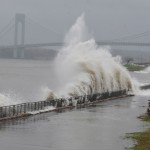 By Peter Galuszka
By Peter Galuszka
Super-storm Sandy raises more issues about nuclear power, the internet and also about global warming.
As the storm struck the New Jersey coast and flooded New York City, three nuclear rectors were shut down because of problems with high water levels and electricity. Another reactor went on standby “alert” because its water intake levels were abnormally high.
The reactors were Salem Unit 1 owned by utility PSEG on the Delaware River in New Jersey and Nine Mile Point 1 and Indian Point in New York. Another reactor, Oyster Creek in New Jersey, went on alert because of high water.
This raises questions about how nuclear power stations can respond to natural events. Dominion’s North Anna units “tripped” and shut down after a rare earthquake a year ago in August. The station was down for three months. Also, according to the Union of Concerned Scientists, the Nuclear Regulatory Commission surveyed all U.S. reactors after an earthquake and tidal wave swamped the Fukushima power station in Japan in March 2011, causing the worst nuclear disaster since Chernobyl in 1986. The NRC found that hardly any of the U.S. reactors were built to withstand what was the maximum flood level on the site at the time they were built.
That, unfortunately, is making things different. Climate change caused by man-made pollution is melting icecaps and raising ocean levels. It is also creating warmer ocean waters and breeding more powerful storms. The combination spells danger for aging nuclear reactors.
Hurricane Sandy was an extremely late season storm and was fed on 70 degree ocean water that seems to have been farther north than usual for late October. The strong possibility is that this is part of the climate change package since most hurricanes along the U.S. East Coast tend to die off after early October although the hurricane season technically runs until Nov. 30.
Downed reactors is just another technology problem. Flooding and power outages in New York affected the World Wide Web and some sites, such as Huffington Post, went blank for hours. In Richmond, for instance, independent radio WRIR could not stream its broadcasts because of the New York problems.
These problems are real and cannot be explained away in their usual way by climate change doubters. We really don’t have the time anymore to indulge their fantasies.


